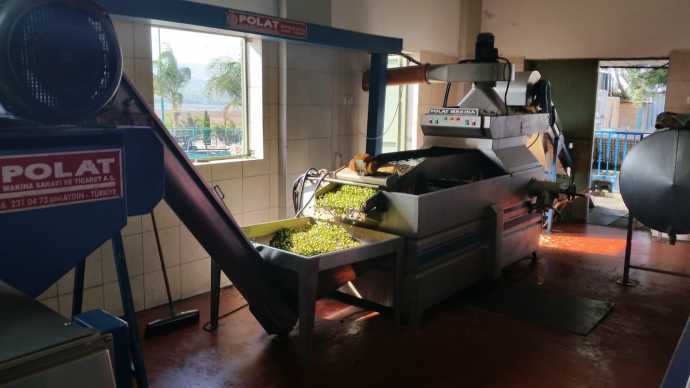Olive-oil presses, which create a lot of waste material called “olive-press cake,” must remove it carefully to prevent pollution and damage to the groundwater, sewage and wastewater treatment systems, the Ministry of Environmental Protection and the Water Authority said on Tuesday.
With the olive harvest soon upon us, the ministry said it will support water corporations in the amount of NIS 680,000 for the removal of the “cakes” formed from the olive presses. Alongside this, the ministry said it is increasing its supervision and enforcement against the processing companies.
Six water corporations – Mei Hagalil, Sovev Shafar’am, Peleg Hagalil, El Ayin, Ma’ayanei Ziv and Mei Rahat – that submitted applications for support meet the required conditions and will be budgeted accordingly, the ministry said.
Dr. Sigal Blumenfeld, director of the ministry’s northern district, said that “Before the start of the harvest season, the ministry contacted all the relevant parties with the aim of providing tools for dealing with the oil-press cake produced as part of the olive oil production process during the harvest period. The ministry works every year in order to reduce the harm caused by the olive oil production process and bolsters enforcement.”
"The ministry works every year in order to reduce the harm caused by the olive oil production process and bolsters enforcement.”
Dr. Sigal Blumenfeld

Guy Reshef, deputy director of the Hydrological Service Division at the Water Authority, noted the authority "prepared in advance this year, as in previous years, to prevent damage to the wastewater treatment facilities and environmental pollution caused during the olive harvests.
This year, in light of an increase in olive crop growth, the support budget was increased and emphasis was placed on continuous monitoring systems for enforcement purposes."
The sewer networks that have been affected in the past include the cities of Karmiel, Acre, Nahariya, Yanuah-Jat, Parod, Rahat and Livnim.
Monitoring olive presses
The water corporations are responsible for monitoring olive presses, and to locate liquid “cake” flows into the public sewer system, to do this, the corporations make use of sampling and placing monitoring devices and sensors.
According to the ministry, there are about 140 active oil presses in the country, with 90 of them being in the north. In the olive oil production process, up to 80,000 cubic meters of waste are produced each year, and it contains a very high concentration of organic, toxic substances.
Unsupervised discharge of the waste causes heavy damage to sewage and purification systems, to the point of clogging them and causing their collapse, significantly impairing the ability to use the effluents from the sewage treatment plant for agricultural use.
In addition, waste material also pollutes the groundwater, as has already happened in the past in areas with high hydrological sensitivity, mainly in the Haifa and Northern districts.
The Environment and Climate Change portal is produced in cooperation with the Goldman Sonnenfeldt School of Sustainability and Climate Change at Ben-Gurion University of the Negev. The Jerusalem Post maintains all editorial decisions related to the content.
